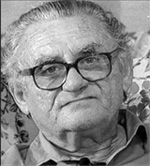|
Hommage: Linduarte Noronha
Introduction
Interview
Movies
 Linduarte Noronha
Linduarte Noronha
Linduarte Noronha was a reporter and film critic
before venturing into documentary film. His first
short film, "Aruanda" (1960), was an adaptation of
one of his newspaper articles. Brazilian film would
never be the same.
"Aruanda" is as important for modern Brazilian cinema
as "Bagaceira", written by José Américo de
Almeida, also born in Paraíba, for our literary modernism.
The Northeastern reality, its myths, textures,
roughness, settings and characters opened
way – in 1960 as in 1928, in film and as in books.
"Aruanda", teaches Noronha, means "promised
land". The film shows the foundation of a "quilombo",
a community of fugitive slaves in Serra do
Talhado and revisits the region nearly a century
after, through a peasant family who subsists on
cotton planted by the men and pottery, the
women's work.
A then young critic from Bahia called Glauber Rocha
compared him to a Rossellini of the dawn of neo-realism.
Jean-Claude Bernardet praises him as "a document
and an interpretation of reality, simultaneously".
In the following decade, Cinema Novo and the
Brazilian documentary would apply his teachings.
"Aruanda" gave origin to a documentary school in
Paraíba, made up mostly of Noronha's crew mates:
Vladimir Carvalho, João Ramiro Mello, Rucker
Vieira. Linduarte Noronha himself would make
only two more movies: the short "Northeastern
Cashew Tree" and, in the 70's, the feature "The
Death Pay Roll", after a frustrated attempt to
adapt, of course, "A Bagaceira".
On the eve of the fiftieth anniversary of the article
that gave origin to "Aruanda" (The Potters of
Serra do Talhado Spring, 1958), It's All True celebrates
Linduarte Noronha's innovating contribution.
This cycle puts together films he directed
himself, his portrait made by another master of
Brazilian documentary film (Geraldo Sarno), two
works that contextualize Paraíba in the year he
was born (1930) and two shorts that are essential
for the Paraíba school. The strength of this
movement is reaffirmed by the hors-concours
screening of the new documentary directed by
Vladimir Carvalho, "Zé Lins's Sugar Cane Mills", a
moving portrait of Paraíba-born writer José Lins
do Rego (1901-1957).
AMIR LABAKI
|
 |


